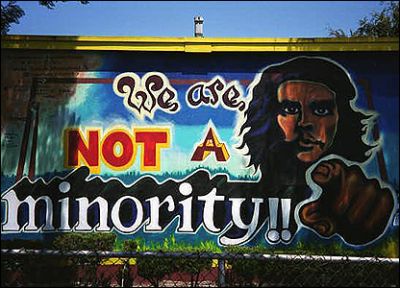Reflections on being a Revolutionary
The term revolutionary is often batted about and is bestowed upon most anyone who finds their ideas falling to the left of the political mainstream. For that reason we have more coffee shop revolutionaries than I can shake a vegan biscotti at! Now I don’t mean that as pot-shot against coffee shop poets (okay, well maybe I did a mean it a little) but really its about the question, “What does it take to be revolutionary?” I was left deeply reflecting on that after watching Che. I’ve been anticipating the film for over a year now and I was lucky enough to see it in its intended four hour format. For all you who are wondering, “Should I really go see a four hour movie?” The answer from me is emphatically, “Yes!” I’ll openly admit that I’m biased, but that is because I am constantly wondering about what it has taken and will take to transform the world.
Now I’m sure many people will be moved by the first half of the film and discuss it a lot, but the second half is what moved me. The first half covers the 26th of July Movement/Cuban Revolution while the second half covers Che’s time in Bolivia organizing the Bolivian Liberation Army. I was struck because the second half displayed Che’s spirit and drive for revolution. While he was immortalized as a figure in the Cuban Revolution, in reality, his vision was far greater than Cuba and even the Americas. When I was a bit younger I tried to read Che in Africa but couldn’t finish it, because I wanted to read about the “victorious” Che. My own naivity kept me from understanding how “victorious” Che and “failing” Che were one in the same. Guevara had a deep belief in the ability of people to transform their realities into something better than what they lived in. This belief and purpose allowed him to continue to fight until the end of his and his comrades lives. As he said, “At the risk of sounding ridiculous, a true revolutionary is guided by a great feeling of love.” This impulse caused Che to travel the globe with the goal of revolution backed and carried out by the people.
In conversations when I discuss change, not even revolution, the two greatest issues tend to be: conceptualizing a different world and beliefs about human nature. We remain in a world where what is in front of us, becomes real. This reality, in turn, becomes a psychological prison where the status quo is the only modus operandi. In the second half of the film, we see Guevara and his troops “fail” at their attempted revolution, in large part due to their inability to convince the people of Bolivia that armed struggle is relevant and another way of life is possible. The social order that we observe, particularly the inequities that we burdened with, do not have to be the way we live. Whenever this point comes up, people quickly ask me, “Well what’s the alternative?” And nearly any alternative that I present seems to “sound good” but is dismissed as impossible. Recently, in one of my courses, students assured me that capitalism could not fail and that the United States would remain the superpower of the world. I was most shocked by these propositions because the majority of my students are of color and come from working class or low income backgrounds. By traditional Marxist theory, they should be the harbingers of class consciousness and potentially even revolution, but they were far from it! In my eyes, they’d resolved themselves to the scraps, trials, and tribulations that the country had doled out to them. Sadly, this is a view that I’ve heard echoed many times by the most oppressed. I wonder, what does it take to break down this allegiance to the present for a vision for the future?
The second barrier goes beyond simple social possibilities and rests at the core beliefs. What is human nature? In everyday conversation I hear people say “well you know it’s human nature.” Well to be honest, I don’t know what human nature is, in fact I’m pretty sure no one does. In this world, the second we enter the earth we are barraged with images and ideas, so what we would “naturally” do is virtually unknown. Couldn’t it be that human nature is not about accumulation of physical goods (meaning greed)? Isn’t it just a possible that human nature is about the accumulation of well being for self and others (meaning valuing life)? Sure, it’s much more difficult to observe the latter, but it seems that there is little reward for valuing someone else’s well-being in contemporary society so I’d expect to witness the former. Is it even possible to see a different world if you believe humans to be corrupt and self-serving? Unfortunately, I’m not even sure that’s rhetorical question to me anymore.
The Che film left me with so many thoughts about what a true revoluationary is. For those wondering, yes the film did sanitize revolution in many ways by curtailing a lot of the blood and guts, but it showed a much different side of struggle. I know towering revolutionaries like Che Guevara and Kwame Ture took their vision beyond borders and gave their lives for potential and actual revolutions, but what does revolution look like for the everyday man? I mean the everyday people who do not become a guerilla, who do not dedicate their life to the struggle? I guess, in the end, that is up to use to decide and demand.
Filed under: Activism, Art, Boundaries, Grassroots, Review



